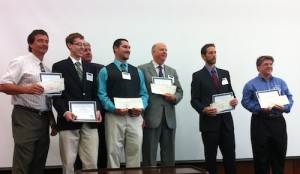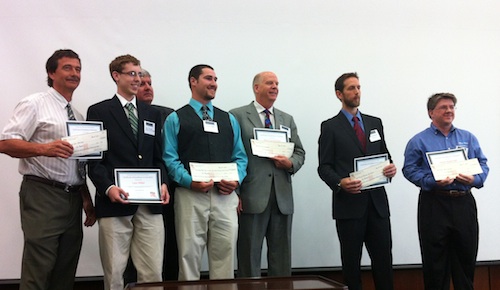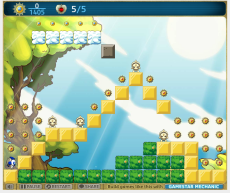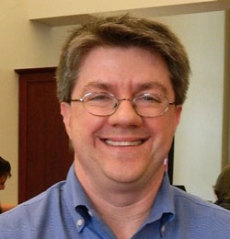 This year’s National STEM Video Game Challenge was a record-breaking event for the Cooney Center and our partners at E-Line Media. With more categories and subcategories than ever before, we counted more than 3,700 entries from middle and high school students and nearly 100 within the adult categories from all over the country.
This year’s National STEM Video Game Challenge was a record-breaking event for the Cooney Center and our partners at E-Line Media. With more categories and subcategories than ever before, we counted more than 3,700 entries from middle and high school students and nearly 100 within the adult categories from all over the country.
The student winners—28 from 11 states and the District of Columbia—were honored at the Celebration for Success at the Smithsonian American Art Museum last Monday. The youth winners will each receive AMD-based laptops, game design software packages, and other tools to support their skill development. Each winner’s sponsoring organization will receive cash prizes and educational software. A total of $80,000 in prizes was awarded to the winners and their sponsoring organizations. Read more about the youth prize winners here.
It was a challenge to narrow down the winning entries to the collegiate and educator categories, but in the end, we awarded five prizes. The winners were invited to demo their games at the Atlantic‘s Technologies in Education Forum, where they were presented their awards by Tom Kalil of the White House Office of Science and Technology Policy. Each team received a prize of $10,000 and will continue to receive mentorship and guidance from the challenge partners and sponsors for their winning game. Read more about the Atlantic Forum here.

From left: Mark Supal, Levi Miller, Tom Kalil, Alex Kampf, Kevin Scirtchfield, Ryan Wehnau, and Martin Esterman
The collegiate category was open to both undergraduate and graduate students.
 Speedy MathTrain, developed by Levi Miller, Stephen Shaefer, Alex Kampf, and Stephen Zabrecky, a team from Purdue University, won the prize for the PBS KIDS stream that challenged participants to develop educational games for children ages 4-8 that focus on specific math skills. Using a math framework created by PBS KIDS’ Read to Learn, the team created an interactive app that makes memorizing multiplication and division tables an animated game.
Speedy MathTrain, developed by Levi Miller, Stephen Shaefer, Alex Kampf, and Stephen Zabrecky, a team from Purdue University, won the prize for the PBS KIDS stream that challenged participants to develop educational games for children ages 4-8 that focus on specific math skills. Using a math framework created by PBS KIDS’ Read to Learn, the team created an interactive app that makes memorizing multiplication and division tables an animated game.
 Cosmic Chain the Math Game, created by Ryan Wehnau from the College of the Redwoods received the prize for the Middle School stream of the category. Cosmic Chain the Math Game is an aesthetic math-puzzler, designed to strengthen the player’s mathematical intelligence, skills, and confidence. Players link values together to build chains and crunch numbers.
Cosmic Chain the Math Game, created by Ryan Wehnau from the College of the Redwoods received the prize for the Middle School stream of the category. Cosmic Chain the Math Game is an aesthetic math-puzzler, designed to strengthen the player’s mathematical intelligence, skills, and confidence. Players link values together to build chains and crunch numbers.
This year marked the first time that we invited professional educators—the very people who know youth and the way they learn the best—to design games for youth (grades pre-K through 12) that teach key STEM concepts and/or foster an interest in STEM subject areas.
 The PBS KIDS stream prize went to Addition Blocks, created by a Martin Esterman, a middle school teacher from Marietta, Georgia. AdditionBlocks is a simple, fun, and challenging digital-learning game that reinforces basic addition skills to improve recall speed and accuracy.
The PBS KIDS stream prize went to Addition Blocks, created by a Martin Esterman, a middle school teacher from Marietta, Georgia. AdditionBlocks is a simple, fun, and challenging digital-learning game that reinforces basic addition skills to improve recall speed and accuracy.
 The Middle School prize was awarded to Mark Supal, an educator from Warren, Michigan, for his game Energy Tycoon. Supal’s game incorporates scientific and engineering practices from the physical, earth/space, and engineering fields, challenging players to create energy with renewable technologies in an efficient and cost effective manner in order to power homes and create a sustainable community.
The Middle School prize was awarded to Mark Supal, an educator from Warren, Michigan, for his game Energy Tycoon. Supal’s game incorporates scientific and engineering practices from the physical, earth/space, and engineering fields, challenging players to create energy with renewable technologies in an efficient and cost effective manner in order to power homes and create a sustainable community.
 Kevin Scirtchfield, a veteran public high school teacher in Fresno, California, was named the winner of the High School prize for his game. Alge-Bingo was created to help Algebra I students (and younger) to develop their equation-solving skills by way of 13 progressively more difficult levels of equations built inside of a Bingo game.
Kevin Scirtchfield, a veteran public high school teacher in Fresno, California, was named the winner of the High School prize for his game. Alge-Bingo was created to help Algebra I students (and younger) to develop their equation-solving skills by way of 13 progressively more difficult levels of equations built inside of a Bingo game.
You can see demos of these winning games in action on YouTube: view the collegiate and educator winners and youth prize winners here. Congratulations to all of our winners in all categories! We look forward to following your work.
Many thanks to all of our sponsors: AMD Foundation, Entertainment Software Association, Xbox 360, and the Corporation for Public Broadcasting-PBS KIDS Ready To Learn initiative. And we couldn’t have gotten the word out without our outreach partners at the American Association of School Librarians, American Library Association, Boys & Girls Clubs of America, BrainPOP, George Lucas Educational Foundation, Girl Scouts of the USA, International Game Developers Association, and One Economy.
Read more about the STEM Challenge on the White House OSTP Blog.




